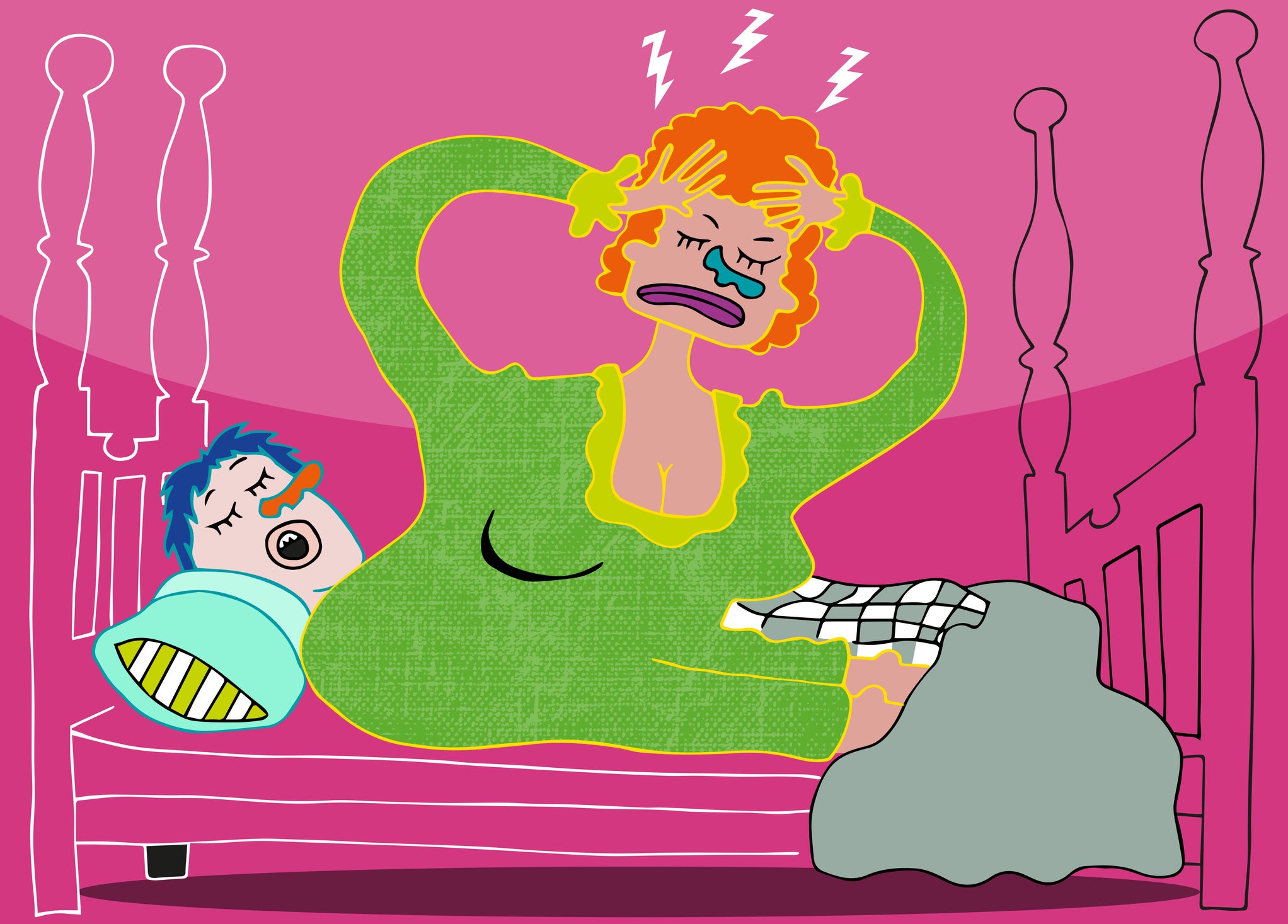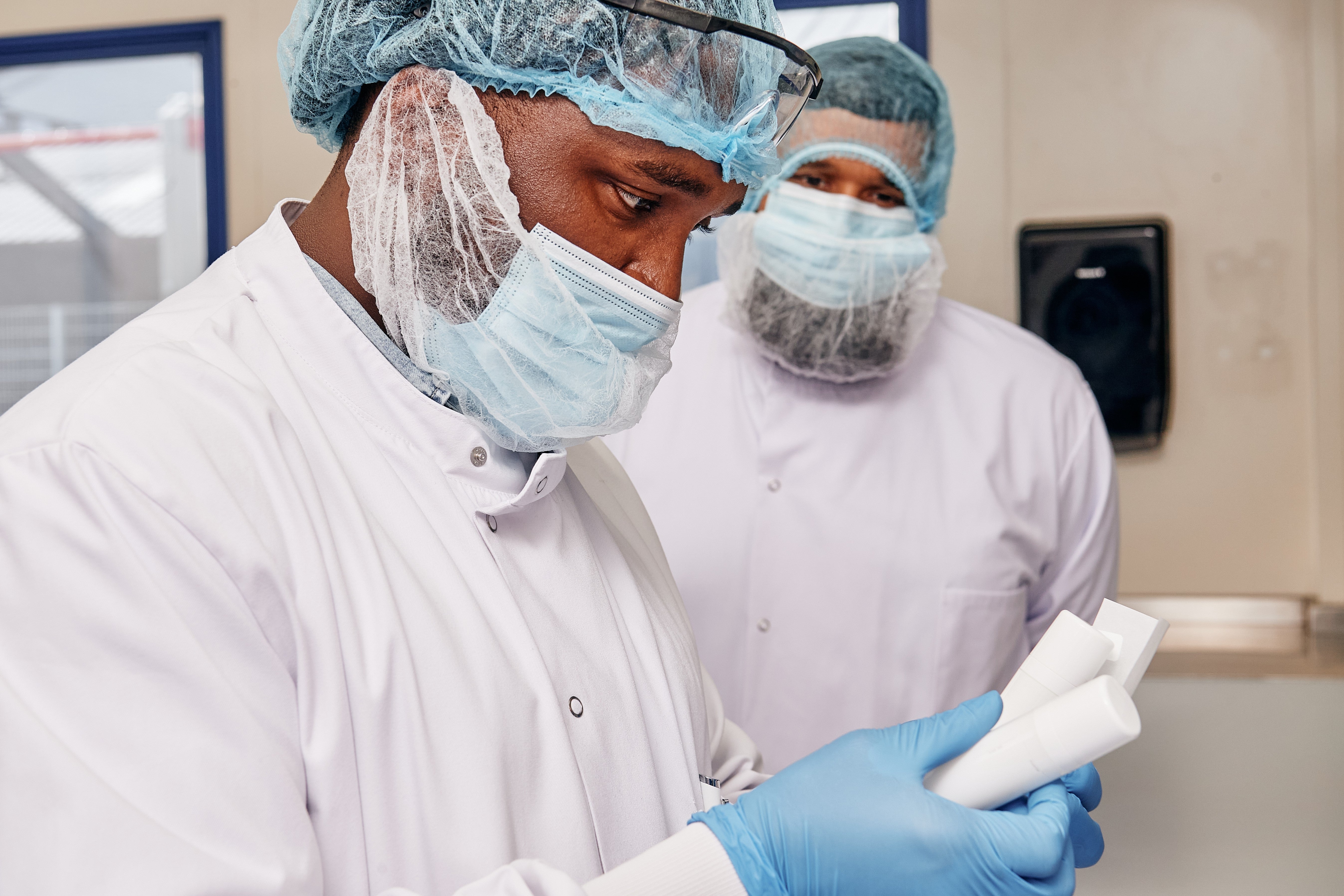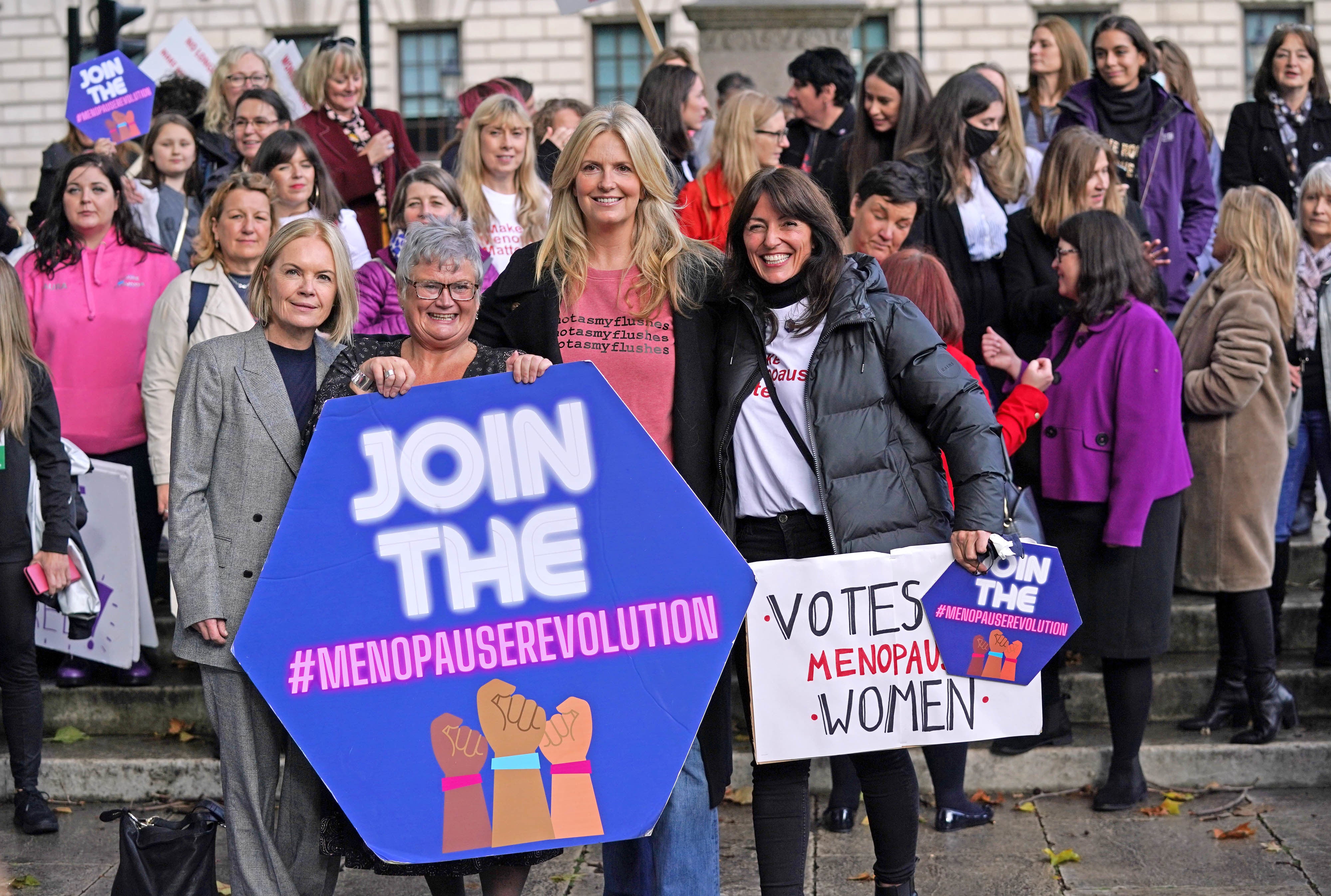Why it was a shock to learn I am perimenopausal and need hormone replacement therapy
It is almost a rite of passage for women, so why did I never think the menopause would affect me? Writes Charlotte Cripps


Mention the word menopause – or perimenopause for that matter – and I always used to yawn. I had no hot flushes. No night sweats. No brain fog. It wasn’t happening to me. In fact, I was so certain I wasn’t suffering from it that I dropped my copy of Davina McCall’s new book, Menopausing: The Positive Roadmap to Your Second Spring, off at the local charity shop for someone who might need it.
Of course, I’d heard about the symptoms women go through. Yes, the hot flushes and night sweats, but also loss of confidence, hair falling out, crawling skin, brittle nails, vaginal dryness, incontinence, and burning tongue. These are symptoms that have led one in 10 women to leave their job in the UK, according to a new survey.
I’d also seen the news. In 2002, hormone replacement therapy (HRT) got a bad rap thanks to a study that warned of the increased risk of breast cancer and therefore many women stopped taking the treatment. It took about 10 years for the data to be re-analysed to find major flaws in the study.
Recently, there has also been a nationwide shortage of HRT on the NHS, leaving women desperate. McCall recently told the BBC’s Sunday Morning show that if there was a shortage of insulin or any other drug it would “get sorted out immediately”. Plus, with the cost of living crisis, campaigners like Holly Willoughby are up in arms that women should have to pay for HRT prescriptions on the NHS – it’s nearly £10 per item for three months’ supply.
But is HRT for everybody? What exactly is it and is it safe? Menopause is like a rite of passage for women. So why have I never cared? Then I started waking up at 3am. With little sleep and two small kids and a job, I started to panic. I had no history of insomnia, even at times when I had far more going on than I do now. It had been going on for a week when a friend said “get your hormones checked out”. My hormones?
The average age of menopause in the UK is about 51 and is defined as the absence of menstruation for 12 months. But the period of hormonal fluctuation leading up to this is called the perimenopause and can last many years.
It hadn’t crossed my mind that at just over 45 I was going through the perimenopause or, God forbid, the menopause. I rang my GP sobbing. It’s true my periods had become erratic after I stopped breastfeeding in late 2019 but, with no other symptoms of perimenopause, I’d put that down to my body being confused after years of gruelling IVF.

I got an emergency GP appointment, but because I am over 45, I was not entitled to a blood test to measure my hormone levels. It’s normal practice to be prescribed standardised HRT by a good GP as soon as you start to experience menopausal symptoms and, as I hadn’t had a period for over 12 months, any investigation was deemed unnecessary.
The doctor prescribed an Oestrogel pump pack gel to be rubbed into my thigh once daily and a 100mg oral capsule of progesterone at night – it all felt somewhat random.
Nightol was also suggested to help me sleep. She also ordered blood tests that the NHS would allow – kidney function, cholesterol, iron levels, and one basic thyroid function test. I was in and out of the GP surgery in five minutes.
After talking to friends, I found many of them were on bioidentical hormones, which come from plant sterols but have the same chemical structure as our own natural hormones and so are well tolerated by the body. They were bandying words like “safer” and made of “yam and plant extracts”.
Others told me bioidentical hormones were a bit witchy woo. You could also get them online but could you guarantee the quality?
What was the difference between the two types of HRTs, synthetic and bioidentical? I decided to find out. It seemed advisable to at least get my hormone levels checked out. I didn’t pick up my NHS prescription and googled bioidentical hormones, it seemed Angelina Jolie and Oprah Winfrey were advocating them.
She also picks up on the high cholesterol as did my GP – but it’s all adding up now. An underactive thyroid can affect cholesterol metabolism – so once my thyroid is sorted, it may normalise
I headed to the Marion Gluck Clinic which is the UK’s leading hormone-balancing clinic that pioneered bioidentical hormones in the UK 25 years ago. They also treat male menopause or andropause with TRT (testosterone replacement therapy) for symptoms including low libido and fatigue.
It started with an initial Zoom consultation with Dr Ghazala Aziz-Scott – the “queen” of bioidentical hormones and the clinical lead doctor. She is an Oxbridge-trained neuroscientist and medical doctor who was a former NHS GP for 25 years and has been entrusted by the founder, Dr Marion Gluck, with continuing the pioneering work of the clinic with a team of nine other very experienced doctors.
She and her team take a holistic approach to treating patients. The session lasts 45 minutes and costs £320. She asks me about my medical history and symptoms but also for my life story. She then sends me off for a full panel of blood tests costing £305.
Seven vials of blood are taken from my arm and soon I have the results back for 67 tests. I also do the Nordic Dutch Plus test costing £319 to check for adrenal dysregulation and evaluate how my body metabolises hormones, particularly oestrogen. This will, according to Dr Ghazala, assess if I produce more toxic oestrogen metabolites which could increase breast cancer risk and affect my long-term safety of taking HRT – should I need it. I do the test at home over a day (saliva and urine samples) and it’s sent to the US to fine-tune the next level of treatment.

First, I learn that I have hypothyroidism – an underactive thyroid. Common signs of an underactive thyroid include tiredness, weight gain, and depression. I’m prescribed daily hormone replacement tablets, Levothyroxine 25mg, to raise thyroxine levels that my thyroid gland isn’t producing enough of. And with a hypothyroidism diagnosis, Dr Ghazala informed me that I can now get all my prescriptions free on the NHS for life.
Usually, the NHS only measure Thyroid Stimulating Hormone (TSH) – as in my case – and if it’s abnormal they measure T4. Mine that day was within the normal NHS range at 3.97, but “the TSH can fluctuate depending on the time of day,” says Dr Ghazala. My TSH in the private blood test one week later is 5.39, which is too high.
“We also need to look at the T4 (thyroxine)and T3 (triiodothyronine) to get an overall picture of thyroid function,” says Dr Ghazala. “We tend to like the TSH below two which indicates an optimal balance, but NHS ranges have higher margins.”
She also picks up on the high cholesterol as did my GP, but it’s all adding up now. An underactive thyroid can affect cholesterol metabolism so, once my thyroid is sorted, it may normalise. I am emailed food plans from the Institute of Functional Medicine that will guide me to improve my metabolic health.
On to my hormones. Well, yes, I’m perimenopausal. My progesterone levels are very low – this is the soothing and calming hormone so it explains my irritability, anxiety and sleeplessness. I also have fluctuating oestrogen, a lack of which can cause hot flushes, and general aches and pains. Oestrogen also affects collagen production affecting the quality of skin and hair.
I’m excited for the next step – when will I feel better? I’m told it can be as quick as 24 to 48 hours. One of Dr Ghazala’s patients described it like ‘the Christmas tree lights coming on’
My DHEA (Dehydroepiandrosterone) is very good at 9.2 – usually, she’s looking at levels of about 3. She thinks this high DHEA is why I’ve had no perimenopausal symptoms until now as DHEA is a precursor to the sex hormones and acts as a reservoir. My testosterone is also at a good level.
Dr Ghazala prescribes me transdermal oestrogen and progesterone creams from the Specialist Pharmacy in London – the first compounding pharmacy of its kind in the UK that produce bespoke medications for the Marion Gluck Clinic. I book in for my next appointment eight weeks later, when she will retest my blood results and we will have the Nordic Test back. Then my personalised hormones will all be combined into one single pump of cream for easy usage; it’s like a pea-sized amount of cream that is easily absorbed in the skin unlike the far larger lump of clear oestrogen gel I would have been rubbing into my thigh on the NHS and with an oral progesterone.
But what exactly is the difference between bioidentical hormones and HRT on the NHS? It turns out – not much. While some women are still being prescribed synthetic HRT on the NHS, the NHS has largely switched to body identical hormones, which my GP prescribed me. It is also plant-based like bioidentical hormones. The big difference is I’m getting a bespoke service. If you have the funds, it’s a wonderful way to monitor your ever-changing hormone levels and take the HRT tailor-made for you, rather than a one size fits all.
The next step is exciting and I wonder when I will feel better. I’m told it can be as quick as 24 to 48 hours. One of Dr Ghazala’s patients described it like “the Christmas tree lights coming on”.
“I feel like I’ve poured a watering can on my patients – like they’ve bloomed,” says Dr Ghazala about meeting patients once the meds kick in at the 8-week appointment.
My medication arrives special delivery by Royal Mail – no need to visit a pharmacy this way. It’s a Thursday and I take the first pill Levothyroxine for hypothyroidism. I reach for my “customised hormone creams” next. Progesterone – I push one pump onto my lower arm and rub it in with the other lower forearm. Then onto the estradiol – one pump daily for one week then going up to twice daily until she combines them into one pump when she’s checked I’m on the right amount.

By Saturday I feel lighter. Not only mentally clearer and sharper, but lighter in body weight as if I’m deflating. All the water retention is easing away and I’m sleeping better. According to Dr Ghazala this is due to the extra progesterone I’m getting which helps with fluid retention. She also suggested I get a magnesium supplement to help with sleep and calm the nervous system.
It’s interesting that compounded bioidentical HRT – such as the treatment I’m given at the Marion Gluck Clinic – is unlicensed. Why is this the case if they are the same as body identical HRT from the NHS?
While the British Menopause Society has advised medics to consider alternative HRT preparations for women who cannot get their usual stock of Oestrogel during the shortage of HRT, including the gel Sandrena or the spray Lenzetto – they still don’t advocate the use of “compounded bioidentical hormones”. I asked the British Menopause Society (BMS) about it.
They sent me a report explaining why they do not licence compounded Bioidentical hormones; reasons include they don’t carry warning leaflets and are commercially available in a regulated form, so compounding is not justified. But, according to Ghazala, it’s more about cost and she says all the products from the Specialist Pharmacy do have patient information leaflets.
“The individual components oestrogen, progesterone and testosterone are licenced in bioidentical hormones but as the compounded bioidentical HRT is tailor-made for each patient, it is classified as unlicenced,” she says.

“As they are natural products with limited scope for a patent, there is no incentive for big pharmaceutical companies to fund large-scale randomised controlled clinical trials to assess this, as unpatented products have limited scope for profit.”
Only big pharmaceutical companies can afford the astronomical costs of licencing a medication.
“The NHS is population-based medicine,” she adds. “It needs to be cost-effective, guideline-driven and act for the greater good – individualised compounding is expensive.”
What is my conclusion? The good news is that my GP did actually prescribe me the correct HRT. It was plant-based and bioidentical, although Dr Ghazala is starting me off on a third of that dose and working me up to the higher dose. But it can often feel like luck of the draw on the NHS.
“If you are oestrogen dominant and aren’t properly assessed as you are over 45, you would have felt worse on HRT containing extra oestrogen and might have decided HRT wasn’t for you.”
Some GPs are still prescribing synthetic oral HRT on the NHS, “We know that oestrogen should be given transdermally to decrease the risk of thromboembolic events or clots, but they are still being given oral oestrogen preparations, and some of the combined HRT patches used have synthetic progestins in them which are more linked to breast cancer risk,” says Dr Ghazala.
The cost privately could become expensive as hormone levels are checked regularly for three to six months and correlated with symptoms to optimise the dose and check it is working – a follow-up is £160. Annual blood tests are needed thereafter – costing £200 to £250. The beauty of bioidentical HRT is that “we can adjust the levels of hormones and type of formulation to suit the individual” says Dr Ghazala because treatment is personalised and compounded in the Specialist Pharmacy.
For some women, places like the Marion Gluck Clinic are a last resort. A report called Menopause and The Workplace, by the gender equality charity, the Fawcett Society, found that only 39 per cent of women who spoke to someone at their GP practice said they were offered HRT once they were diagnosed with menopause.

“Our compounded products are always available, and we have no supply issues. NHS supply issues created a lot of stress for women, and they often had to change brands which can then have variable absorption, and this can affect symptom control. Sometimes women were then put onto the synthetic oral preparations.”
Private menopause treatment might not be affordable for everybody. Until the 8-week appointment, it cost approximately £1,104. It’s about £100 for the compounded hormone cream approximately every three months (160 pumps lasts 80 days if you are doing two pumps a day). The bases can be hypoallergenic and if you don’t tolerate taking it transdermally, it can be made into sublingual lozenges or even vegan drops to be used under the tongue. You will see the same hormone doctor who is available for ongoing assessment and provides continuity of care. A prescribing nurse is also on hand for emergency repeat prescriptions and the Specialist Pharmacy has a dedicated patient helpline.
They also prescribe regulated body identical hormones but with the advantage of in-depth monitoring. Additional hormones such as compounded testosterone and DHEA that is not available on the NHS can be added. “It’s a win-win,” says Dr Ghazala.
If money wasn’t an issue, I’d definitely stick with Dr Ghazala as the monitoring is so reassuring and it is combining the HRT into one bespoke cream. But – now I get free NHS prescriptions due to my hypothyroidism – I’m tempted to convert my meds into body identical hormones and take the oral progesterone, which she says is safe.
Do I feel better? Yes, I’m sleeping and I’ve lost weight. My heart feels open again. I’m not in a state of rage and insomnia. I might not feel the full benefits yet but I feel like a whole new world has opened up for me. Thankfully I won’t one day be having a hot flush or worse as I’ve got the hormones right next to me in a single pump of high-quality cream.
Synthetic HRT was promoted as the “fountain of youth” in the 1980s, but it is now largely a thing of the past. Since 2019, Body identical HRT is deemed the gold standard by the BMS, not synthetic HRT. While some women sail through the menopause, many don’t. I seem to have caught it just before it could have become worse.
“As long as it’s bioidentical or body identical HRT being used, women can be on treatment long term,” says Dr Ghazala. “It helps with short-term symptoms of perimenopause and menopause, but also has longer-term benefits for health such as osteoporosis prevention, cardiovascular disease and prevention of degenerative brain conditions such as Alzheimer’s. A woman born today can live until she’s 100 so we have to ensure a good healthspan as well as a good lifespan.”
An initial consultation at The Marion Gluck Clinic costs £320




Join our commenting forum
Join thought-provoking conversations, follow other Independent readers and see their replies
Comments